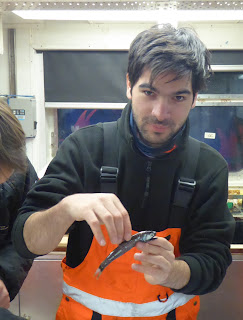No final de cada
expedição Antártica, fazemos sempre uma breve avaliação do que aconteceu no
cruzeiro, dos resultados obtidos, do que correu bem, do que se gostou mais e
dos próximos passos e se há alguma coisa que temos que melhorar.
Esta
expedição, chamada JR16003, iniciou-se a 5 de Dezembro 2016 e terminou a 24 de
Janeiro 2017 (partida e chegada a Portugal) e teve lugar a bordo do navio
Britânico James Clark Ross no Oceano Antártico. Esta foi a nona expedição
Antártica para José Xavier e a terceira para José Seco, os únicos Portugueses a
bordo.
Nesta expedição, com cientistas do Reino Unido, Portugal, Alemanha,
Itália e Polónia, e apoio fundamental dos oficiais e tripulação, teve o
objetivo de recolher organismos no Oceano Antártico (na área de estudo chamada
“Western Core Box” junto à Geórgia do Sul e junto à Frente Polar Antártica). Os
organismos marinhos foram recolhidos usando diferentes tipos de redes, com
diferentes tamanhos e malhagem, desde zooplâncton (ex. Camarão do Antártico Euphausia superba) a lulas e peixes. Recolhemos
também amostras de água (para obter a matéria orgânica particulada).
Todas as
amostras foram recolhidas com o objetivo de compreender a biogeografia, habitat
e níveis tróficos de organismos ao longo da cadeia alimentar, e também a bioacumulação
de metais pesados. Um dos resultados mais surpreendentes foi sem dúvida encontrar
o camarão do Antártico, que é conhecido por ser uma espécie tipicamente
Antártica (e um elemento muito importante na cadeia alimentar Antártica), a
norte da Frente Polar Antártica. Pessoalmente, também ter encontrado a lula Histioteuthis eltaninae (muito
importante na dieta de numerosos predadores, mas rara nas nossas redes
cientificas) foi uma das melhores surpresas. Obtivemos quase todas as amostras que
desejávamos, e o próximo passo é analisar as muitas amostras para conhecer o
habitat e nível trófico das numerosas espécies (através de isótopos estáveis de
Carbono e Azoto) e o seus níveis de metais pesados.
Um agradecimento especial
aos colegas cientistas, oficiais e tripulação do James Clark Ross e às várias
instituições e programas (British Antarctic Survey, Universidade de Coimbra,
Marine and Environmental Sciences Centre, University of Aveiro, University of
St. Andrews, Integrating Climate and Ecosystem Dynamics Program (ICED), SCAR
AnT-ERA (Antarctic Tresholds – Ecosystem Resilience and Adaptation, Program Polar
Português PROPOLAR, Association of Polar Early Career Scientists (APECS
Portugal)) que ajudaram para esta expedição ser um sucesso. A nível pessoal, o
que mais gostámos: A passagem de ano ser passada literalmente à pesca com redes
e peixes na mão, apanhar animais raros que muito irão ajudar-nos a perceber
como o Oceano funciona, o convívio e profissionalismo entre todos, seguir o
vosso entusiasmo e apoio online (através do blog e facebook) e a beleza da
Antártida (particularmente aqueles 4 dias junto à estação cientifica Britânica
de Rothera). Muito obrigado e até breve!!!!
At
the end of an Antarctic expedition, we always do a brief review of what
happened in the research cruise, of the results/samples obtained, what went
right, what we enjoyed more and the next steps. This expedition, named JR16003,
started on the 5th December and ended on the 24th January 2017 (starting and
ending in Lisbon) and took place onboard of the RRS James Clark Ross in the
Southern Ocean. This was the 9th expedition to José Xavier and the 3rd to José
Seco, the only Portuguese onboard. In this expedition, scientists from United
Kingdom, Portugal, Germany, Italy and Poland, with the support of the officials
and crew, collected organisms from the Southern Ocean, in the area of the
“Western Core Box” close to South Georgia and across the Antarctic Polar Front
(APF). These organisms were collected using a range of scientific nets of
different sizes and meshes, including zooplankton (such as the Antarctic krill
Euphausia superba), squid and fish. Water samples were also collected (to
obtain information of the Particulate organic matter in the water).
All these
samples had the objective to help us understand the biogeography, habitat and
trophic levels of these organisms through the Antarctic food web, as well as
the bioaccumulation of trace metals in these organisms. One of the most
interesting results was finding Antarctic krill north of the APF (in warmer
waters), as this species is typically Antarctic. Personally, catching Histioteuthis
eltaninae (very important in the diet of numerous predators but rare in
scientific nets) was also a surprise. Most of the samples needed were
successfully obtained.
Next step is to prepare and analyse the samples in the
laboratory to study habitat and trophic levels (via stable isotopic analyses of
Carbon and Nitrogen) and trace metals. A special acknowledgement to our
colleagues scientists, officers and crew of the James Clark Ross and the
various organizations and research programs (British Antarctic Survey, University
of Coimbra, Marine and Environmental Sciences Centre, University of Aveiro,
University of St. Andrews, Integrating Climate and Ecosystem Dynamics Program
(ICED), SCAR AnT-ERA (Antarctic Tresholds – Ecosystem Resilience and
Adaptation, Program Polar Português PROPOLAR, Association of Polar Early Career
Scientists (APECS Portugal) that made this expedition a success.
What we
enjoyed more: The New Year Eve spent fishing with literally fish in our hands,
catching amazing organisms that will help us understand the Southern Ocean, the
professionalism and friendships amongst all, following your enthusiasm and
support online (via the blog and facebook) and the beauty of Antarctica
(particularly those 4 days close to the British Research station Rothera). Many
thanks and talk to you VERY soon!!!











3 comentários:
Houve alguma evidência da mudança do clima?
Boa pergunta. Vimos muitos icebergues e surpreedentemente encontrámos o camarão do Antártico mais a norte do que o previsto. Na peninsula Antártica sabemos que essa região está realmente a aquecer...sugiro ler: Gutt J, Bertler N, Bracegirdle TJ, Buschmann A, Hosie G, Isla E, Schloss I, Smith CR, Xavier JC (2015) The Southern Ocean ecosystem under multiple climate change stresses - an integrated circumpolar assessment. Global Change Biology 21:1434-1453
Espeor que ajude
Grande abraço Jose
Muito obrigado. Abraco. Bom trabalho.paulo
Enviar um comentário